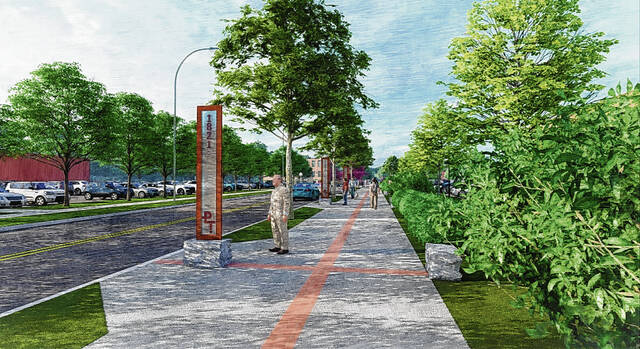
A city rendering shows the proposed design of the 1821 Bicentennial Trail extension planned for downtown Columbus. Groundbreaking is tentatively scheduled next week.
City officials have approved putting almost $1.1 million toward the 1821 Bicentennial Trail.
On Monday, the Columbus Redevelopment Commission approved using $411,488 from the Central Allocation Area and $683,741 from the Certified Technology Park Fund to help fund the project. Redevelopment Director Heather Pope said the combined total covers $1,095,229 for the expected base bid on the trail.
The Board of Works opened bids for the project on Tuesday. The lowest total base bid was from Dave O’Mara Contractors at close to $1.12 million. The company bid $821,048.50 on the base bid for the trail and $296,603 on the base bid for water main replacement.
According to assistant city engineer Andrew Beckort, the aforementioned nearly $1.1 million estimate does not include the water main replacement.
Milestone Contractors’ total base bid was a little over $1.46 million (with a little under $1.02 million for the trail), and All-Star Paving bid a little under $1.62 million (with the trail cost at about $745,000). Each company also submitted five alternates for other components of the project, such as historical markers, said Beckort.
Pope said redevelopment officials hope to make a contractor recommendation to the board on Tuesday, Dec. 28 and, if all goes as planned, hold a groundbreaking ceremony on the same day at 10:30 a.m. behind Columbus City Hall.
According to Pope, the project has a total bid package of $2.27 million. Of this, $159,300 has already been approved for construction document preparation, design development and concept work, and about $351,000 is set aside as a contingency fund.
From there, the construction cost estimate is broken down into two pieces: the base bid and the alternate.
“There’s two pieces to this,” said Randy Royer with Hitchcock Design Group, which has worked on the project design with engineering firm American Structurepoint. “There’s the infrastructure piece, which is what we would call the trail. And then there are the alternates, which are the historical markers and … the bells and whistles, the things that really were added or incorporated into the design to help celebrate the bicentennial.”
The base bid originally came out to just over $1 million, said Pope. It covers infrastructure and elements such as moving curbs, relocating utilities, the 10-foot-wide multi-use trail, brick paver installation, drainage issues, ADA compliance for intersections and “the base for any alternatives that are decided later to be installed.”
When considering this estimate, the city looked into what could be done through the Department of Works to save costs.
“We’ve been able to identify just shy of $129,000 in cost savings,” Pope said. This reduced the base bid to about $891,000. Then, after adding an a 20% contingency, the phase 1 base bid came out to $1,095,229.
In addition to the funding allocated by the commission, the Parks Foundation has granted $250,000 for the project, Duke Energy has granted $10,000, and Kenny Glass has donated $50,000. Pope said that these gifts will go toward the alternate bids and provide a starting base to raise funds for that piece of the project.




